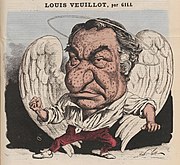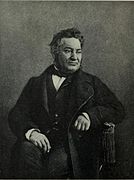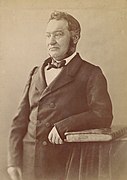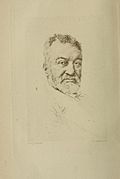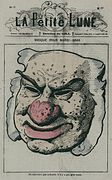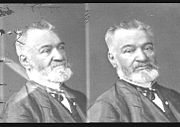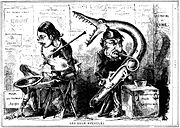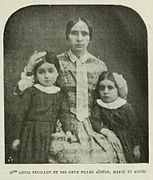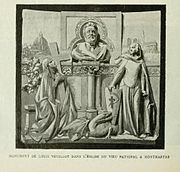Louis Veuillot
Louis Veuillot | |
|---|---|
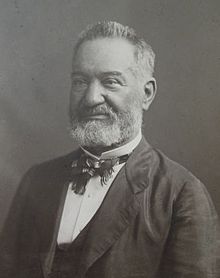 Veuillot, by Nadar, 1873. | |
| Born | 11 October 1813 Boynes, Loiret Department, France |
| Died | 7 March 1883 (aged 70) Paris, France |
| Occupation | Journalist, writer |
| Nationality | French |
| Spouse | Mathilde |
| Children |
|
| Relatives |
|
| Part of a series on |
| Conservatism |
|---|
 |
Louis Veuillot (October 11, 1813 – March 7, 1883) was a French journalist and author who helped to popularize ultramontanism (a philosophy favoring Papal supremacy).
Career overview
Veuillot was born of humble parents in Boynes (Loiret). When he was five years of age, his parents relocated to Paris. With little education, he gained employment in a lawyer's office, and was sent in 1830 to serve with a newspaper of Rouen, and afterwards to Périgueux. He returned to Paris in 1837, and a year later visited Rome during Holy Week. There he embraced ultramontane sentiments, and became an ardent champion of Catholicism. The results of his conversion were published in Pélerinages en Suisse (1839), Rome et Lorette (1841) and other publications.
In 1843, Veuillot joined the staff of the newspaper Univers Religieux, a journal created in 1833 by Abbé Migne, and soon helped make it the leading organ of ultramontane propaganda as L'Univers. His methods of journalism, which made great use of irony and ad hominem criticism,[1] had already provoked more than one duel, and he was imprisoned for a brief time for his polemics against the University of Paris. In 1848, he became editor of the newspaper, which was suppressed in 1860,[2] but revived in 1867, when Veuillot resumed his ultramontane propaganda, causing a second suppression of his journal in 1874.[3] Veuillot then occupied himself by writing polemical pamphlets[4] against moderate Catholics, the Second French Empire and the Italian government. His services to the papal see were recognized by Pope Pius IX, on whom he wrote (1878) a monograph. Matthew Arnold said of him:
M. Louis Veuillot is a polemic worthy of the golden age of polemics. He is singly devoted to ultramontanism; he lives on a small fixed salary from the proprietors of the Univers; he is a man of the purest and simplest domestic life; he is poor, and has a large family, but he has refused all offers of place and salary from the government, and maintains his entire independence.[5]
Some of his papers were collected in Mélanges Religieux, Historiques et Littéraires (12 vols., 1857–1875), and his Correspondance (7 vols., 1883–85) has great political interest. His younger brother, Eugène Veuillot, published (1901–1904) a comprehensive and valuable life, Louis Veuillot.
Works
- Correspondance, Tome II, Tome III, Tome IV, Tome V, Tome VII, Société Générale de Librairie Catholique, 1885.
- Rome et Lorette, J. Casterman, 1841.
- De l'Action des Laiques dans la Question Religieuse, Au Bureau de L'Univers, 1843.
- Vie de Notre-Seigneur Jésus-Christ, Librairie Catholique de Périsse Frérés, 1864 [1st Pub. 1846].
- Les Libres-Penseurs, Jacques Lecoffre et Cie., 1850.
- La Légalité: Dialogue Philosophique, Plon Frères, 1852.
- Les Droits du Seigneur au Moyen Âge, L. Vivés, 1854.
- Le Parti Catholique, L. Vivés, 1856.
- Le Pape et la Diplomatie, Gaume Frères et J. Duprey, 1861.
- Waterloo, Gaume Frères et J. Duprey, 1861.
- Satires, Gaume Frérés et J. Duprey, 1863.
- Le Guêpier Italien, Victor Palmé, 1865.
- A Propos de la Guerre, Palmé, 1866.
- L'Illusion Libérale, Palmé, 1866.
- Les Odeurs de Paris, Palmé, 1867.
- Les Couleuvres, Victor Palmé, 1869.
- Corbin et d'Aubecourt, Victor Palmé, 1869.
- La Liberté du Concile, Victor Palmé, 1870.
- Paris Pendant les Deux Sièges, Victor Palmé, 1871.
- Le Parfum de Rome, Victor Palmé, 1871.
- Mélanges Religieux, Historiques et Littéraires, Tome II, Tome III, Tome IV, Tome V, Tome VI, L. Vivés, 1857-1875.
- Molière et Bourdaloue, Société Générale de Librairie Catholique, 1877.
- La Guerre et l'Homme de Guerre, Victor Palmé, 1878.
- Çá et Lá, Société Générale de Librairie Catholique, 1883.
- Historietes et Fantaisies, Société Générale de Librairie Catholique, 1883.
- Études sur Victor Hugo, Société Générale de Librairie Catholique, 1886.
Works in English translation
- The Life of Our Lord Jesus Christ, Peter F. Collier, 1878.
- Stephanie, M. H. Gill and Son, 1883.
- "The Essence of Giboyer (A Retort to 'Giboyer's Son')," The Universal Anthology, Vol. XXVII, 1899.
- In Menczer, Béla (Ed.), Catholic Political Thought, 1789-1848, University of Notre Dame Press, 1962.
- "The True Freedom of Thought," pp. 196–205.
- The Liberal Illusion, Angelus Press, 2005.
Quotations
"It is easy to see where North America stands at present, and whither it is tending. Its rapid progress, due to the most degrading works, has fascinated Europe; but the results of this progress, exclusively material, already appear. Barbarism, profligacy, general bankruptcy, systematic destruction of the native races, idiotic slavery of the conquerors, bound to the most trying and repulsive of lives under the yoke of their own machinery. America might founder in the ocean once for all, and the human race would suffer no loss thereby. Not a saint, not an artist, not a thinker has it produced, unless one may term thought the aptitude for twisting iron for the construction of freight trains. The priests who wear out their lives there cannot create a civilization. Thus far there is no civilization in America, and as far as appearances go, there never will be." (L'Univers)
"Newspapers have become such a danger that it is necessary to create many. You cannot contend against the Press, except through its multitude. Add flood to flood, and let them drown one another, forming no more than a swamp, or, if you will, a sea. The swamp has its lagoons, the sea its moments of slumber. We will see whether it is possible to build some Venice within it."
"When I voted, my equality tumbled into the box with my ballot; they disappeared together."
"If I could re-establish a class of nobles, I should do so at once, and I would not belong to it."
"Amongst the amusements of Paris must be counted duels between journalists."
Gallery
-
Caricature of Louis Veuillot, by André Gil, from La Lune, April 21, 1867.
-
Portrait of Louis Veuillot, n.d.
-
Picture by Nadar, 1850's.
-
Portrait of Louis Veuillot, n.d.
-
"Masque pour Mardi-Gras." Caricature of Louis Veuillot, La Petite Lune, No. 37, 1878-1879.
-
"Pâquerette." Caricature of Louis Veuillot, La Petite Lune, No. 2, 1878-1879.
-
"Les Hommes D'Église." Caricature of Louis Veuillot, by Faustin Betbeder, 1870-1871.
-
Picture of Louis Veuillot, During the 1870s.
-
Pictures of Louis Veuillot, by Nadar, 1856.
-
"Les Deux Aveugles," (Vermorel and Veuillot), by Claude Guillaumin, La Rue, October 26, 1867.
-
Centennial Celebration of the Birth of Louis Veuillot, October 5, 1913.
-
Louis Veuillot Birthplace, in Boynes, Loiret, n.d.
-
Veuillot's Tombstone, Montparnasse Cemetery, n.d.
-
Veuillot, his two Daughters, Agnès and Marie, and his Sister, Élise, 1858.
-
Wife and Daughters of Louis Veuillot, n.d.
-
Monument in the Church of Voeu National, in Montmartre.
See also
Notes
- ^ "In Paris M. Louis Veuillot has given us another shameful specimen of Ultramontanism. Not satisfied with comparing savants to the phylloxera, he likens Protestantism to a loathsome disease whose name is usually confined to medical works." — "The Jesuits in France," The New York Times, August 16, 1875.
- ^ "The Greater Excommunication, The Emperor and the Pope," The New York Times, April 20, 1860.
- ^ "The Clerical Press and Marshall Serrano," The New York Times, September 24, 1874.
- ^ "An impetuous, brutal journalist, whose verve and ardour came from Rabelais and Voltaire through Joseph de Maistre, Louis Veuillot was at the same time an exquisite writer and a violent Christian; he distributed holy water as though it were vitriol and handled the crucifix like a club." — Hanotaux, Gabriel (1905). Contemporary France. London: Archibald Constable & Co., p. 622.
- ^ Arnold, Matthew (1960). "England and the Italian Question." In: On the Classical Tradition, R. H. Super (Ed.), University of Michigan Press, p. 89.
References
- This article incorporates text from a publication now in the public domain: Chisholm, Hugh, ed. (1911). Encyclopædia Britannica (11th ed.). Cambridge University Press.
{{cite encyclopedia}}: Missing or empty|title=(help)
Further reading
- Allison, John M. S. Church and State in the Reign of Louis Philippe, Princeton University Press, 1916.
- Boureau, Alain. "God's Party in the Great Combat," in The Lord's First Night: The Myth of the Droit de Cuissage, University of Chicago Press, 1998.
- Brown, Marvin L. Louis Veuillot: French Ultramontane, Catholic Journalist and Layman, Moore, 1977.
- Cornut, Etienne. Louis Veuillot, Victor Retaux et Fils, 1891.
- Corrigan, Raymond. The Church in the Nineteenth Century, The Bruce Publishing Company, 1938.
- Christophe, Lucien. Louis Veuillot, Wesmael-Charlier, 1967.
- Dimier, Louis. Les Maîtres de la Contre-Révolution au 19e Siècle, Nouvelle Librairie Nationale, 1917.
- Fernessole, Pierre. Les Origines Littéraires de Louis Veuillot, 1813-1843, J. de Gigord, 1923.
- Foucart, Claude. L'Aspect Méconnu d'un Grand Lutteur, Atelier National de Reproduction des Thèses, Université de Lille III, 1978.
- Gough, Austin. Paris et Rome. Les Catholiques Français et le Pape au XIXe Siècle, Éditions de l'Atelier, 1996.
- Gurian, Waldemar. "Louis Veuillot," Catholic Historical Review 34, 1951.
- Laurioz, Pierre-Yves. Louis Veuillot: Soldat de Dieu, Éd. de Paris, 2005.
- Le Roux, Benoît. Louis Veuillot: Un Homme, un Combat, Téqui, 1984.
- MacCaffrey, James. "The Church in France," in History of the Catholic Church in the Nineteenth Century, Vol. I, M. H. Gill & Son, 1910.
- MacCaffrey, James. "Louis Veuillot," Part II, Part III, The Irish Ecclesiastical Record 17, 1905.
- Menczer, Béla. "Louis Veuillot," in Catholic Political Thought, 1789-1848, University of Notre Dame Press, 1962.
- Murray, Eustace Clare Grenville. "Louis Veuillot," in Men of the Third Republic, Strahan & Co., 1873.
- Myers, Rev. E. "Louis Veuillot," The Catholic World 77, 1903.
- Neill, Thomas Patrick. "Louis Veuillot," in They Lived the Faith; Great Lay Leaders of Modern Times, The Bruce Publishing Company [c. 1951].
- Nielsen, Fredrik Kristian. The History of the Papacy in the XIXth Century, Vol. 2, John Murray, 1906.
- O'Connor, R. F. "Louis Veuillot," Part II, The Monitor 1, 1879.
- Parsons, Reuben. "Louis Veuillot," in Studies in Church History, F. R. Pustet & Co., 1901.
- Preuss, Arthur. "The Veuillot Centenary," The Fortnightly Review 21, 1914.
- Preuss, Arthur. "A Fighting Editor," Part II, Part III, Part IV, Part V, Part VI, The Review 9, 1902.
- Soltau, Roger Henry. "Veuillot and L'Univers," in French Political Thought in the 19th Century, Russell & Russell, 1959.
- Sparrow-Simpson, W. J. "Louis Veuillot," French Catholics in the Nineteenth Century, Society for Promoting Christian Knowledge, 1918.
- Spencer, Philip Herbert. Politics of Belief in Nineteenth-Century France: Lacordaire, Michon, Veuillot, H. Fertig, 1954.
- Tavernier, Eugène. Louis Veuillot; l'Homme, le Lutteur, l'Écrivain, Plon, 1913.
- Teeling, T. T. "Louis Veuillot and L'Univers," Part II, The Dolphin 8, 1905.
- Veuillot, Eugène. Louis Veuillot, Tome II, Tome III, Victor Retaux, 1904.
External links
- Catholic Encyclopedia: Louis Veuillot
- Encyclopædia Britannica: Louis Veuillot
- Dr. John C. Rao: Louis Veuillot – Icon and Iconoclast

